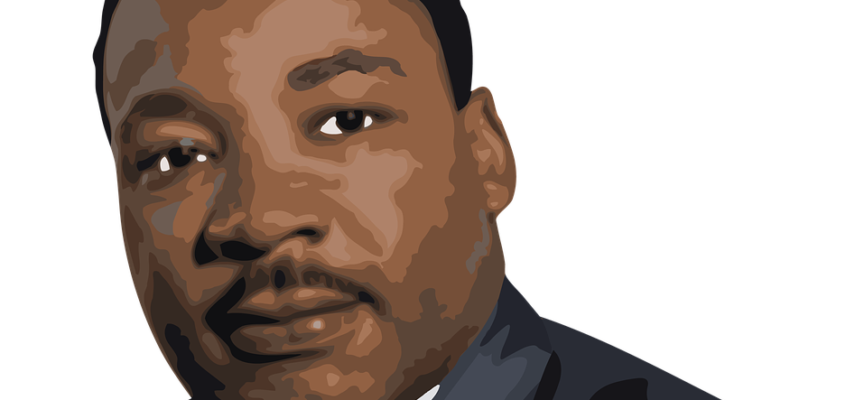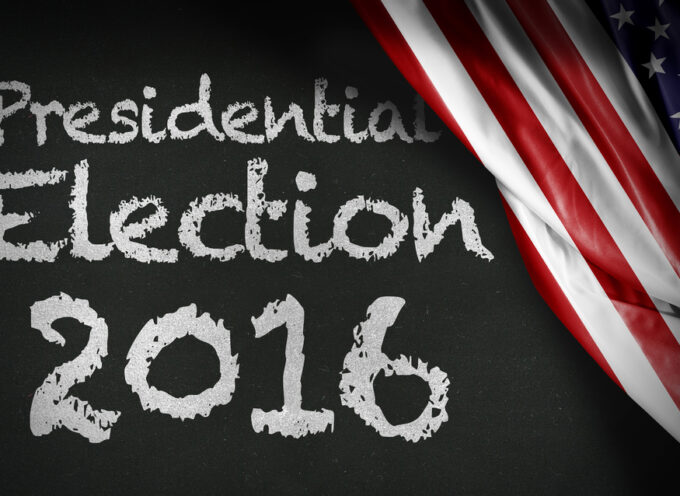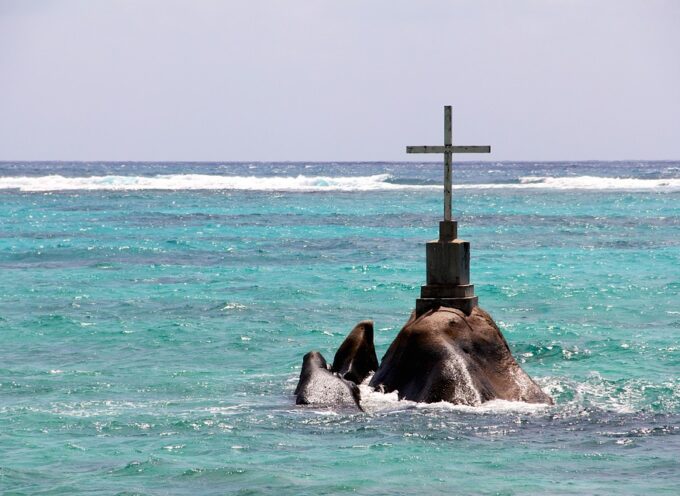Recently, I composed a brief survey, asking my website readers to tell me what they like and dislike about my articles, and what they’d want to talk about if they had some time to chat with me personally.
I gained valuable insights from the survey, one of which is that many of my readers want me to continue to explore issues related to race, racial (in)justice, racial (dis)unity, and racial reconciliation. Similarly, my mailbag is full to the brim with inquiries about race-related social movements and cultural developments. The survey also let me know that the vast majority of my website readers are whites who identify as religious evangelicals and political conservatives.
For that reason, and in recognition of the Martin Luther King, Jr. holiday, I offer this brief “explainer” of MLK’s life and legacy. An article this brief cannot do full justice to King’s life or legacy, so along the way I will link to other articles, books, and resources that expand upon the minimal comments offered here.
Birth, Early Life, Education
Martin Luther King, Jr. was born in Atlanta, Georgia in 1929 to a middle-class family known for its Christian ministers. King’s father represented the third generation to heed the call. In fact, King’s father was born Michael King, but after traveling to Germany to visit the homeland of the Great Protestant Reformer Martin Luther, King decided to change his name and his son’s to “Martin Luther King.”
Eventually, King, Jr. would become a pastor, walking in the footsteps of his father, grandfather, and great-grandfather. As a child, however, he struggled with doubts regarding his faith. An early source of these doubts was the inner turmoil caused by his parent’s exhortation to “love the white man” even in light of his experience of the bitter injustice of racial segregation. As he grew older, King also struggled with doubts regarding many of the sensational claims of the Bible, which seemed irreconcilable with modern knowledge.
King found solace, however, in the progressivist social gospel of his professors while an undergraduate student at Morehouse College. In liberal Christianity, King discovered resources to not only address his intellectual doubts about the reasonableness of the Bible’s teachings, but also to address racial inequality. Thus, after graduating with a B. A. in Sociology from Morehouse in 1948, he enrolled to study theology and ministry at Crozer Theological Seminary.
King excelled at Crozer, graduating first in his class with a B.Div. in 1951. He then pursued a Ph.D. in Systematic Theology from Boston University. He studied a number of modern theologians, including Paul Tillich, Henry Nelson Wieman, Reinhold Niebuhr, and Karl Barth. During these years of doctoral study, he fastened his heart and mind upon core convictions that would be formative for the rest of his life, especially that the heart of Christ’s message is the call to love one’s neighbor, and that neighbor-love has radical social implications.
In 1955 King graduated and moved to Montgomery, Alabama, having been called to be the pastor of Dexter Avenue Baptist Church.
Montgomery Bus Boycott and Early Activism
When King arrived in Montgomery, he was thrust onto the national stage. The Montgomery Improvement Association selected King immediately to head the Montgomery Bus Boycott. Beginning with Rosa Parks’ ejection from a bus in 1943, and continuing with her now-famous refusal to move from her seat in 1955, the reality of bus segregation in Montgomery had become a focal point of early civil rights protests. King led a boycott of the Montgomery bus system which lasted 385 days, culminating in the U. S. District Court’s 1956 ruling that Montgomery’s bus segregation policy was unconstitutional.
The success of the boycott put King in the national spotlight of a growing civil rights movement, and led to his co-founding of the Southern Christian Leadership Conference (SCLC). The SCLC focused on harnessing the organizing power and public witness of black churches, placing the church at the center of King’s program for social action. The SCLC played a significant role in mobilizing black voters and catalyzing the Civil Rights Act of 1957, which formed task forces to address voting rights and access to voter registration.
Civil Rights and Non-Violence
In 1959 King journeyed to India to study Mahatma Gandhi’s teaching on nonviolent civil disobedience, which had already been influential in King’s life and early activism. Gandhi’s influence would prove foundational for King’s strategy throughout the early 1960’s, in which he helped organize “freedom rides,” “sit-ins,” and other types of non-violent demonstrations.
Perhaps the most famous of King’s efforts during this time was his 1963 campaign in Birmingham. This campaign led to his arrest and eventually caused him to write a “Letter from Birmingham Jail,” in which King defends his course of civil disobedience and calls white pastors to join the cause. Several months later, King and other civil rights leaders led the March on Washington for Jobs and Freedom. It was during this March, which drew a quarter-million people to the National Mall, that King delivered his famous “I Have a Dream” speech.
Assassination
Throughout the mid-1960’s, King’s efforts continued to galvanize the country, placing the civil rights movement at the forefront of public debate. However, King’s focus had grown beyond civil equality for black Americans, extending to other concerns such as economic inequality, worker’s rights, and the Vietnam War.
It was during this phase of King’s career, as he increasingly tasted success, that he was assassinated. On April 4, 1968 a white nationalist, James Earl Ray, shot King while King was standing on the balcony of the Lorraine Motel in Memphis, Tennessee. Ray was apprehended two months later while trying to immigrate to Rhodesia where a white minority held political power over a black majority.
After King’s assassination, many efforts were made commemorate King’s life and legacy at the federal and state levels, with Congressman John Conyers proposing in 1968 to make his birthday a federal holiday. These efforts were stalled, however, until 1983 when President Ronald Reagan signed a bill recognizing the third Monday of January as a federal holiday. It was not until 2000, however, that all 50 states embraced the observance.
(For additional brief biographical articles about King, click here, here, here, and here.)
Theological Significance
King was influenced by a view, sometimes called “theological personalism,” that emphasizes the dignity of human persons and the interconnectedness of human communities. Personalism asserts that the highest and most intrinsically valuable reality is personality or personhood, a quality humanity shares with God himself who is the source of human personhood.
These two emphases grounded King’s social ethic, which saw individual inequality and injustices as injustices against the whole community of persons. A sin against one is a sin against all. This view of humanity’s interconnectedness cause King to recognize that his drive for social justice was not merely for the benefit of the black community, but for the good of the whole nation. We must love one another, he argued, because we are all persons and intrinsically valuable in the eyes of God. Thus, King highlighted that, while injustice only touches some people directly, it is touches all people indirectly.
I write as a theological conservative and I find it disheartening that so many of the theological conservatives of King’s day were unhelpful or combative towards his efforts. Some theological conservatives were personally prejudiced towards blacks. Others might not have been personally prejudiced but nonetheless refused to act in the face of injustices built into America’s cultural institutions (e.g. legal, political, ecclesiastical). Still others had bought into socially passive and isolationist forms of fundamentalist Christianity that left them ill-equipped to think Christianly and critically about social and cultural questions. Thus, King turned to liberal and neo-orthodox theologians to help build his framework of thought, gaining from them a robust emphasis on social justice but undermining or rejecting some of the key doctrines of the Christian faith.
Political Significance
King’s legacy stands as the preeminent example of the significance and power of nonviolent civil disobedience in a democratic society. Although there are times when revolutionary violence may be justified (e.g. American Revolution), as a general rule nonviolent civil disobedience stands as the most substantial and momentous form of justifiable action.
King also is exemplary for drawing upon the Christian faith to shape his speech and actions in politics and public life. From beginning to end King’s activism flowed out of his theology, and he anchored his public arguments in his theological commitments. In particular, he drew upon his Christian convictions concerning the dignity of human beings made in God’s image and likeness, and the freedom of conscience to make one’s own decisions about matters of ultimate importance.
King viewed freedom as essential to personhood, and he rejected any attempt to disenfranchise people by taking away their basic rights and liberties. King models for us the necessity of bringing our convictions to bear on public policy issues for the common good.
King’s Complicated Legacy
King’s legacy is not without complications. A number of rumors and allegations exist regarding King’s sexual philandering. Most recently a 1968 FBI dossier was declassified and made public, in which it is alleged that King maintained regular sexual relations with women other than his wife, participated in drunken orgies at which “abnormal” sexual practices took place, and fathered a child out of wedlock. Despite this, the FBI dossier should not be taken as incontrovertible fact, for the evidence it cites in support of its claims is limited to allegations made by non-neutral parties, including the FBI. In fact, included in the dossier is evidence that an FBI employee or someone with ties to the FBI sent an anonymous letter to King in 1964, calling for his suicide. Thus, although various lines of evidence coalesce to make clear that he engaged regularly in sexual activity outside of marriage, it is not clear how often or to what extent.
Another complication of his legacy is the allegation that King had ties to communist sympathizers and might have even harbored sympathies himself. As I see it, those allegations are misleading. King certainly had socialist leanings, but he shows no evidence of connection to explicitly communist influences. A third factor complicating his legacy is that King plagiarized portions of his dissertation (see here and here). In 1991, a Boston University committee ruled that King had at points failed to make proper attribution, but did not revoke the dissertation because it nonetheless had made original contributions to the field. A close reading of King’s other writings reveals that he borrowed material without attribution.
Finally, as we’ve noted already, King hedged on or rejected certain historic Christian doctrines. For Bible-believing Christians, this is not an insignificant matter. At various points in his life, he questioned the historicity of certain biblical teachings, including the divinity of Christ. King’s view of biblical authority was textbook modernist, asserting the Bible must be reinterpreted along modern sensibilities in order to find its truth for today.
(For further reading concerning King’s philandering, click here and here; concerning allegations of communism, click here and here; concerning plagiarism, click here and here; and theological heterodoxy or heresy, click here and here.)
Takeaways for White Evangelicals
In spite of King’s complicated legacy, there is much to admire in his life and writings. Theologically, we should admire his affirmation of the dignity of every human being as created in the image and likeness of God. And we should admire his recognition that an injustice against one person, or against one group of people within a community or nation, is an injustice against the entire community or nation.
Politically, we affirm his choice of nonviolent civil disobedience to rectify serious injustices in our nation. We affirm the way he drew upon the Christian faith to shape his public speech and political actions. And we admire his repeated affirmation of the liberties of speech and religion and of the basic rights of all human beings, regardless of race or status.
In fact, each year, the Martin Luther King, Jr. holiday provides a special opportunity for white evangelicals to reflect upon the historic sins of many of our forefathers, and the lurking temptations of racial sin today. As I’ve written elsewhere, we need to reject secular paradigms for overcoming racism in order to find better and more theologically sturdy ways of fighting racial injustices we see perpetrated by prejudiced individuals or embedded in cultural institutions.
There are many ways in which white Evangelicals admirably represent Christ and his gospel. I am convinced, however, that overcoming racism is not yet one of the ways that we represent him consistently and admirably. Let us pray that the King of all nations will help us to repent of our sins, repair our ignorance, and carve out a path of gospel faithfulness for the sake of our souls, for the love of our black brothers and sisters, for the health of the church, and for our witness to the world.
Additional Resources
Books that Honor and Build upon MLK’s Legacy
6 Books White Christians Should Read (in Honor of MLK’s Legacy)
Videos that Honor and Build upon MLK’s Legacy
Can You Be an Activist (like MLK) and an Evangelical? (Thabiti Anyabwile)
Articles that Honor and Build upon MLK’s Legacy
What Martin Luther King’s Legacy Means for the Church (Russell Moore)
How the Protestant Reformation led to Martin Luther King, Jr. (Mika Edmonson)
A Few Reasons King’s Vision for America Remains Unfulfilled (Thabiti Anyabwile)
A Better and More Conservative Approach to Overcoming Racism (Bruce Ashford)
White Christian conservatives should oppose protests by white supremacists (Bruce Ashford)
An Evangelical Conservative’s Guide to the Alt-Right (Bruce Ashford)
Subscribe
Never miss a post! Have all new posts delivered straight to your inbox.








Thank you for taking time to write about Dr. King. As an African American Christian, I would like to offer a few criticisms. First, there was no mention of the many acts of violence enacted on negroes. Mentioning the Freedom Rides without mentioning the riots and bringing up Birmingham without mentioning the fact that the local white, Christian community literally bombed a church does not hold your readership’s past legacy for their accountability. The fact that we needed (and still need) civil rights movements shows more culpability than you admit in your essay.
Second, many negro intellectuals were communists. Why- because we were shut out of capitalism. Your readers need to understand there was good logic behind considering other options. Capitalism was leading to lynchings of innocent negroes. It makes sense to look for other options.
Third, you say that the American revolution was a case where violent revolt was necessary. If so, a violent revolt in Puerto Rico and Guam are appropriate. They are American territories. Their citizens pay taxes and serve in our armed forces, while they do not have representation in congress and can not vote for president. Would you support a violent revolt, which would be started due to taxation without representation?
Finally (I could go on, but I’ll stop here), your critique of his theology is narrow in scope. Put yourself in the shoes of the negro in 1950. Listen to the leading theologians tell you you are inferior to the white man. Then have them tell you the Bible is inerrant. My family knew that we weren’t stupid, immoral, or unathletic. But church told us that. Why WOULD we (and Dr. King) buy into a Bible as perfect. That would be stupid.
Right now, evangelicals are saying the same things about Black Lives Matter as they did about CORE, SNCC and the SCLC. Colin Kaepernick is being treated like John Carlos and Tommy Smith by people who don’t even know about CORE, SNCC, the SCLC, John Carlos or Tommy Smith. It is imperative that you help educate your students, staff and parishioners that protesting black people have a valid point just like protesting conservatives.
Thank you for reading this and keep serving others through Christ.
Dr. Stanley,
Thank you for taking the time to offer some very thoughtful and helpful comments. In order, I agree that the acts of violence are significant and that negro intellectuals were oppressed by capitalist powers. I could have and maybe should have mentioned both of those. I limited myself to a 2,000 word article (which is already longer than most Americans will read) and thus had to cut out a significant amount of material from my lecture notes that i could have included in this article. I have written at length about violence against blacks, especially in chapter 11 of my book “One Nation under God,” in which I show MLK’s and John Perkins’ experiences with violence and their responses to it. As for the critique of his theology, I agree and in the article I did point out that i regret that conservative theologians were either racist or socially passive. Finally, I agree that there are many personally prejudiced white conservatives (but also a great many who are not) and that there are many white conservatives who do not recognize the way racism has corrupted our cultural institutions (although, again, a great many who do recognize it). Thank you for taking the time to comment and especially for the kind tone.
Blessings,
Bruce
When a man is a giant, it becomes easier to see his warts, don’t you think? We remember and characterize people by what was most important about them, not their flaws. Dr. King was a giant of Christian charity, justice and humanity. Whether he was speaking about the plight of his race or about the Vietnam War, he had the courage of his convictions and was nobody’s fool. He must have been quite aware that he was on the path to martyrdom.
We don’t venerate the memory of JFK for his licentiousness, or of Gandhi for his odd relationship with his niece. Even the saintliest of people have had to struggle against their own sinful human nature. Many great people who fall far short of saintliness have manifested traits of character that are worthy of imitation, and some of these individuals have arguably served as God’s instrument at crucial moments in history. (Think of Winston Churchill, for example.) And there are countless “ordinary” men and women who, while never achieving renown, have performed heroic and virtuous deeds–whatever their shortcomings. (If you think about the people in your own life, you can probably name a few.)
So when we think about the good Dr. King, we need not always go off on a tangent about his alleged misdeeds. Let’s remember what made him stand out from the general crowd of sinful humanity.